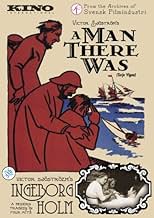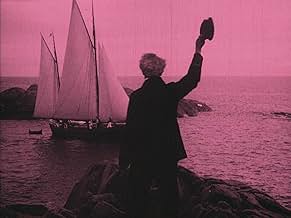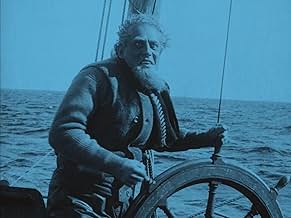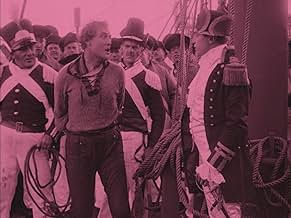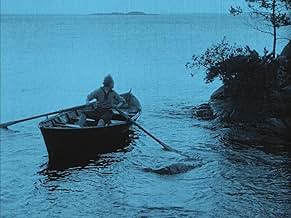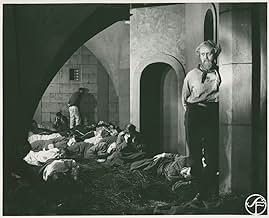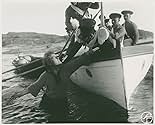IMDb RATING
7.3/10
2.5K
YOUR RATING
Terje Vigen, a sailor, suffers the loss of his family through the cruelty of another man. Years later, when his enemy's family finds itself dependent on Terje's beneficence, Terje must decid... Read allTerje Vigen, a sailor, suffers the loss of his family through the cruelty of another man. Years later, when his enemy's family finds itself dependent on Terje's beneficence, Terje must decide whether to avenge himself.Terje Vigen, a sailor, suffers the loss of his family through the cruelty of another man. Years later, when his enemy's family finds itself dependent on Terje's beneficence, Terje must decide whether to avenge himself.
- Director
- Writers
- Stars
Eric Abrahamsson
- En fiskare
- (uncredited)
Hildur Carlberg
- En kvinna i byn
- (uncredited)
Gucken Cederborg
- Den nya hustrun i Terjes stuga
- (uncredited)
John Ekman
- Norsk fånge i fängelset
- (uncredited)
Nils Elffors
- En av Terjes kamrater (1)
- (uncredited)
Emil Fjellström
- En fiskare på stranden
- (uncredited)
Julius Hälsig
- Engelsk officer i fängelset
- (uncredited)
Herman Lantz
- En av Terjes kamrater (2)
- (uncredited)
William Larsson
- Den nye mannen i Terjes stuga
- (uncredited)
- …
Gunnar Norberg
- Self
- (uncredited)
Hans Sjöblom
- En liten pojke
- (uncredited)
Nanny Sjöblom
- Mor med son i knäet
- (uncredited)
Fritz Ström
- Vitskäggig gammal gubbe
- (uncredited)
Jenny Tschernichin-Larsson
- En kvinna på stranden
- (uncredited)
- Director
- Writers
- All cast & crew
- Production, box office & more at IMDbPro
Featured reviews
For students of film, this is a must-see. Sjostrom proved to be highly influential in the development of Scandanavian and Northern European film. His output was prolific, but TERJE VIGEN is one of my favorites-- it captures well the angst and anxiety so pregnant among Scandanavian and Danish masters (Dreyer and Bergman come to mind as spiritual successors/contemporaries of Sjostrom). TERJE VIGEN, in particular, is one of those stories that will haunt but also reward. The cinematography is what one would expect of a film that is literally more than 100 years old-- innovative for its time, it is very subtle. Where this film really shines is in the phenomenal acting, especially by Sjostrom himself.
Terje Vigen (1917) directed by and starring the father of Swedish cinema, Victor Sjöström, is a true masterpiece of early cinema.
The story is simple and revolves around Terje Vigen, a sailor, who suffers the loss of his family through the cruelty of another man. Years later, when his enemy's family finds itself dependent on Terje's beneficence, Terje then must decide whether to avenge himself.
When comparing Terje Vigen to its peer films of the 1910's such as L'Inferno (1911), From the Manger to the Cross (1912), The Straw Man (1914), Birth of a Nation (1915) and even the masterful Intolerance (1916), what stands out in Sjöström's film making is it's emotional impact rather than its production design or acting prowess. It is a mature depiction of human pain, suffering and redemption, that far succeeds its historical immaturity. Also particularly noteworthy is Rodulf Sahlberg's amazing score for the film.
Ii highly recommended it for film buffs and those interested in cinema history. Victor Sjöström's protegé, Ingmar Bergman would continue the beginning of the Swedish film making legacy in becoming one of cinema history's most revered directors.
The story is simple and revolves around Terje Vigen, a sailor, who suffers the loss of his family through the cruelty of another man. Years later, when his enemy's family finds itself dependent on Terje's beneficence, Terje then must decide whether to avenge himself.
When comparing Terje Vigen to its peer films of the 1910's such as L'Inferno (1911), From the Manger to the Cross (1912), The Straw Man (1914), Birth of a Nation (1915) and even the masterful Intolerance (1916), what stands out in Sjöström's film making is it's emotional impact rather than its production design or acting prowess. It is a mature depiction of human pain, suffering and redemption, that far succeeds its historical immaturity. Also particularly noteworthy is Rodulf Sahlberg's amazing score for the film.
Ii highly recommended it for film buffs and those interested in cinema history. Victor Sjöström's protegé, Ingmar Bergman would continue the beginning of the Swedish film making legacy in becoming one of cinema history's most revered directors.
10CJBx7
Poverty, loss, revenge, and man's inhumanity to man are the themes that propel director Victor Sjostrom's film TERJE VIGEN (1917) (listed here under its English title A MAN THERE WAS). Sjostrom portrays the title character in this adaptation of a poem by noted author Henrik Ibsen. Terje is a sailor who supports his small family in Norway. A blockade by the English navy causes Terje to undertake a dangerous voyage to get supplies for his family, but he is caught and imprisoned. When he learns of his family's death from starvation, he becomes a broken man. One day he comes unexpectedly face to face with the captain responsible for his imprisonment, as he and his family are caught in a violent storm. What choice will Terje Vigen make?
The story is told in approximately one hour. Modern filmmakers could learn much from the economy and concision of these early features. The narrative is straightforward, simple and unadorned, with no padding or extraneous subplots, and the story is told most effectively. It uses title cards sparingly, and in a very interesting fashion. Lines from the original poem are displayed on the screen, then the action described in the lines takes place, and the viewer is able to follow from there.
The actors do fine work in this film. Sjostrom proves to be a fine actor in the lead role, imbuing his character with dignity, sorrow, tenderness, anger, and many other emotions. The supporting cast is also effective, particularly Bergliot Husberg as Mrs. Vigen. The actors show restraint and naturalism in their parts, largely avoiding the tendency towards big melodramatic gestures that marked contemporary theatrical productions.
Equally notable is the cinematography, which depicts both the beauty and the dangerous ferocity of the sea, as well as the starkness of the island landscapes. Sjostrom made very effective use of the Norwegian scenery, causing nature to become a character in its own right in the film. Tinting adds to the moody atmosphere. The camera is mostly stationary, according to the custom of the time, but the shots are very well composed, like paintings. In addition, the film is well edited, not allowing shots to go on longer than necessary.
This film was definitely very moving and memorable. TERJE VIGEN is a compelling and concise tale of the effects of man's inhumanity to man, and of the dilemmas that individuals face when tempted to cast compassion aside. It is rendered effectively through succinct scripting, heartfelt and naturalistic acting, and artfully composed cinematography. It is definitely a masterpiece of silent cinema. SCORE: 10/10
The story is told in approximately one hour. Modern filmmakers could learn much from the economy and concision of these early features. The narrative is straightforward, simple and unadorned, with no padding or extraneous subplots, and the story is told most effectively. It uses title cards sparingly, and in a very interesting fashion. Lines from the original poem are displayed on the screen, then the action described in the lines takes place, and the viewer is able to follow from there.
The actors do fine work in this film. Sjostrom proves to be a fine actor in the lead role, imbuing his character with dignity, sorrow, tenderness, anger, and many other emotions. The supporting cast is also effective, particularly Bergliot Husberg as Mrs. Vigen. The actors show restraint and naturalism in their parts, largely avoiding the tendency towards big melodramatic gestures that marked contemporary theatrical productions.
Equally notable is the cinematography, which depicts both the beauty and the dangerous ferocity of the sea, as well as the starkness of the island landscapes. Sjostrom made very effective use of the Norwegian scenery, causing nature to become a character in its own right in the film. Tinting adds to the moody atmosphere. The camera is mostly stationary, according to the custom of the time, but the shots are very well composed, like paintings. In addition, the film is well edited, not allowing shots to go on longer than necessary.
This film was definitely very moving and memorable. TERJE VIGEN is a compelling and concise tale of the effects of man's inhumanity to man, and of the dilemmas that individuals face when tempted to cast compassion aside. It is rendered effectively through succinct scripting, heartfelt and naturalistic acting, and artfully composed cinematography. It is definitely a masterpiece of silent cinema. SCORE: 10/10
Beautiful cinematography along the rugged Norwegian coastline and a powerful message of forgiveness are the highlights of this film from Victor Sjöström, which was a landmark in its day. It's Ibsen's story of a man who tries to get past a British blockade to feed his hungry wife and baby, but is caught and imprisoned for five years. By the time he gets home, they've perished. I went in unfamiliar with the story and thought it might be a Tarantino-like tale 1917-style, especially when the man comes across the British captain who showed him no mercy and has a chance for vengeance. It's such a touching thing that he doesn't do so given the depths to which mankind was sinking in WWI at the time.
Channeling Christ really gives an extra meaning to the backlit crosses we see in the cemetery in one of the film's beautiful shots. Another that stands out in my mind is the old man sitting and staring out at the sunset over the water, and there is real depth of feeling throughout the film. The only reason for the slightly lower review score was the overall pace, which I found slow for such a simple story, with the exception of the scenes of tension. Sjöström immerses us so well into this world we can practically taste the sea salt and I love him for it, I just wish there had been a little meat on the bones of this story. On another night my score may have been higher, and this is worth seeing though.
Channeling Christ really gives an extra meaning to the backlit crosses we see in the cemetery in one of the film's beautiful shots. Another that stands out in my mind is the old man sitting and staring out at the sunset over the water, and there is real depth of feeling throughout the film. The only reason for the slightly lower review score was the overall pace, which I found slow for such a simple story, with the exception of the scenes of tension. Sjöström immerses us so well into this world we can practically taste the sea salt and I love him for it, I just wish there had been a little meat on the bones of this story. On another night my score may have been higher, and this is worth seeing though.
Terje Vigen / A Man There Was (1917) :
Brief Review -
Victor Sjöström Gives Birth to an undying formula of Forgiveness over Vengeance in the most expensive Swedish film of its time. "Ingeborg Holm" (1913) by Victor Sjöström had a huge impact on the Swedish audience as well as foreign audiences who were underestimating Swedish films at the time. With Terje Vigen, he made the most expensive Swedish film of the time and apparently kicked off the golden era for Swedish cinema. I have witnessed this compassionate formula of "forgiveness" in many movies made in the last 10 decades, including a film made in 2022. Recently, there was a Bollywood film called "Jalsa", which used the same formula, while the most acclaimed works based on the same formula in the past few years had to be "Rubaru Roshni" (2019) and "Kaanekkaane" (2021). Knowing Terje Vigen has set the formula is nothing less than a blessing. I mean, I can't name all those hundreds of films that used the same formula in this brief write-up, but come on, how can they all be termed great for copying it from an old, unknown film? So let's give credit where it's due. The film is about Terje, a sailor who suffers the loss of his wife and kid during the Napoleonic Wars of 1809. He is captured by a brutal British officer, which changes his life forever and leaves him all alone in the world. Will he get his revenge? That's where the kick is. I won't spoil it, but I guess you already know it. Victor Sjöström's trendsetter drama is full of life, tragedy, drama, and conflicts, and all are relatable. You can find yourself in Terje, especially when you assume it's anything before the 21st century. Apart from pioneering dramatic conflicts, Terje Vigen also set benchmarks for big-scale movie making at that time. Overall, another great film in Master Victor Sjöström's filmography.
RATING - 7.5/10*
By - #samthebestest.
Victor Sjöström Gives Birth to an undying formula of Forgiveness over Vengeance in the most expensive Swedish film of its time. "Ingeborg Holm" (1913) by Victor Sjöström had a huge impact on the Swedish audience as well as foreign audiences who were underestimating Swedish films at the time. With Terje Vigen, he made the most expensive Swedish film of the time and apparently kicked off the golden era for Swedish cinema. I have witnessed this compassionate formula of "forgiveness" in many movies made in the last 10 decades, including a film made in 2022. Recently, there was a Bollywood film called "Jalsa", which used the same formula, while the most acclaimed works based on the same formula in the past few years had to be "Rubaru Roshni" (2019) and "Kaanekkaane" (2021). Knowing Terje Vigen has set the formula is nothing less than a blessing. I mean, I can't name all those hundreds of films that used the same formula in this brief write-up, but come on, how can they all be termed great for copying it from an old, unknown film? So let's give credit where it's due. The film is about Terje, a sailor who suffers the loss of his wife and kid during the Napoleonic Wars of 1809. He is captured by a brutal British officer, which changes his life forever and leaves him all alone in the world. Will he get his revenge? That's where the kick is. I won't spoil it, but I guess you already know it. Victor Sjöström's trendsetter drama is full of life, tragedy, drama, and conflicts, and all are relatable. You can find yourself in Terje, especially when you assume it's anything before the 21st century. Apart from pioneering dramatic conflicts, Terje Vigen also set benchmarks for big-scale movie making at that time. Overall, another great film in Master Victor Sjöström's filmography.
RATING - 7.5/10*
By - #samthebestest.
Did you know
- GoofsA title card references the year of the blockade as 1809. Great Britain and Sweden were allies in 1809, so there was no blockade. However, after she was forced to make peace with France after losing The Finnish War and the Pomeranian War, Sweden declared war against Great Britain. The Anglo-Swedish War (1810-1812) existed only on paper: British ships were still allowed to dock on the island of Hanö and trade with the Baltic states. Great Britain blockaded Sweden during World War I.
- Quotes
[first lines]
Title Card: On a barren, remote islet, there lived an odd, grizzled man.
- ConnectionsEdited into Spisok korabley (2008)
Details
Box office
- Budget
- SEK 60,000 (estimated)
- Runtime
- 1h 5m(65 min)
- Color
- Sound mix
- Aspect ratio
- 1.33 : 1
Contribute to this page
Suggest an edit or add missing content

